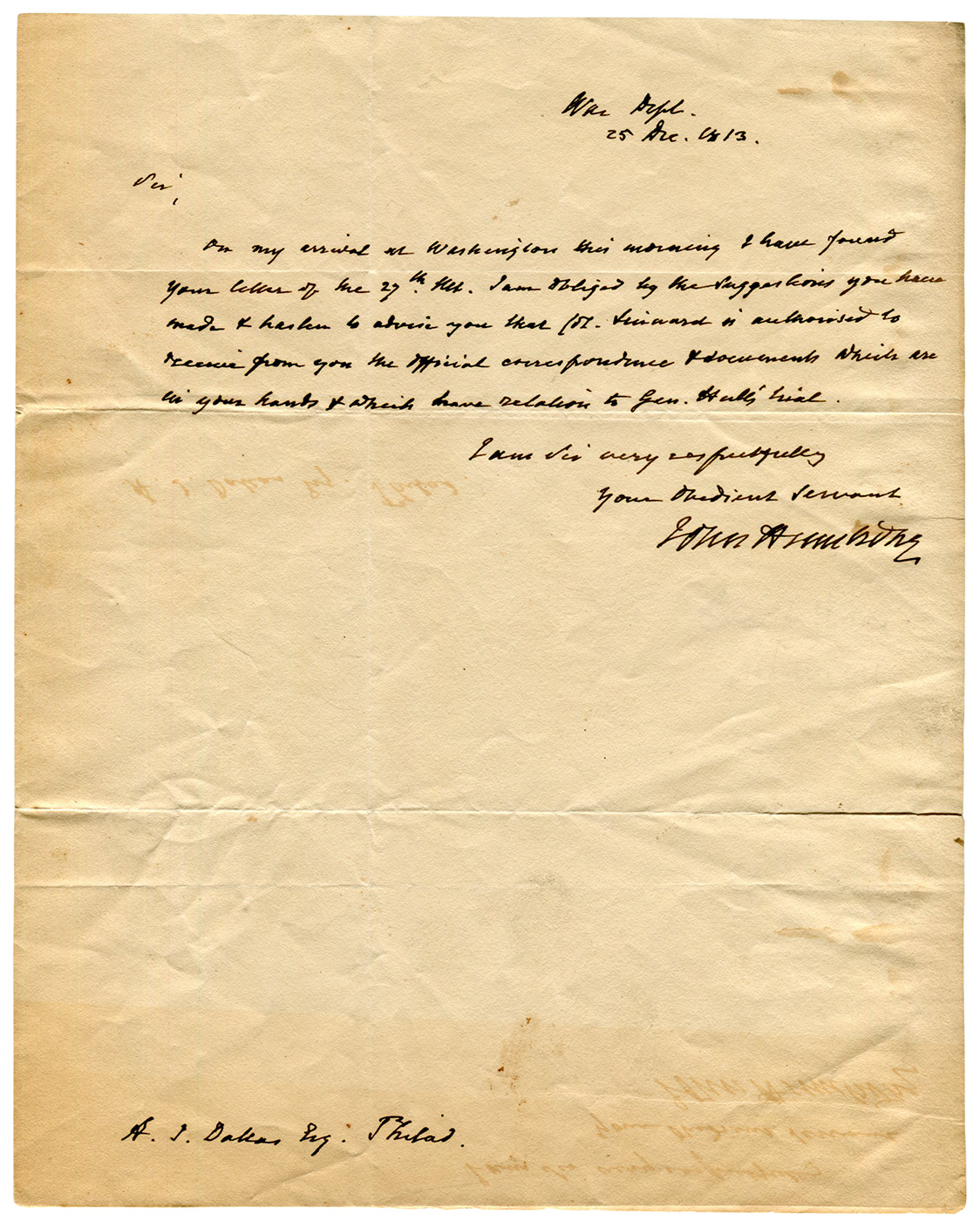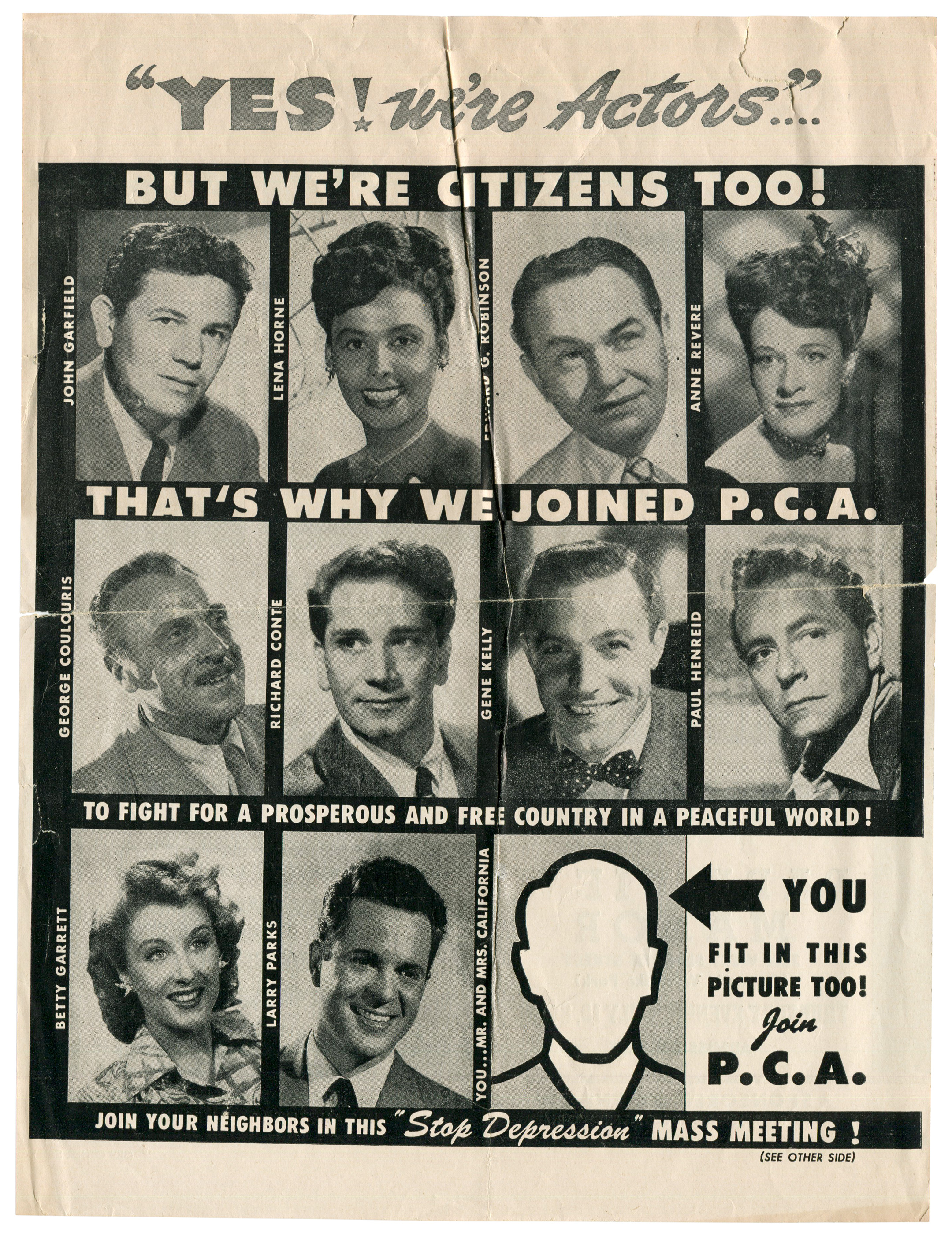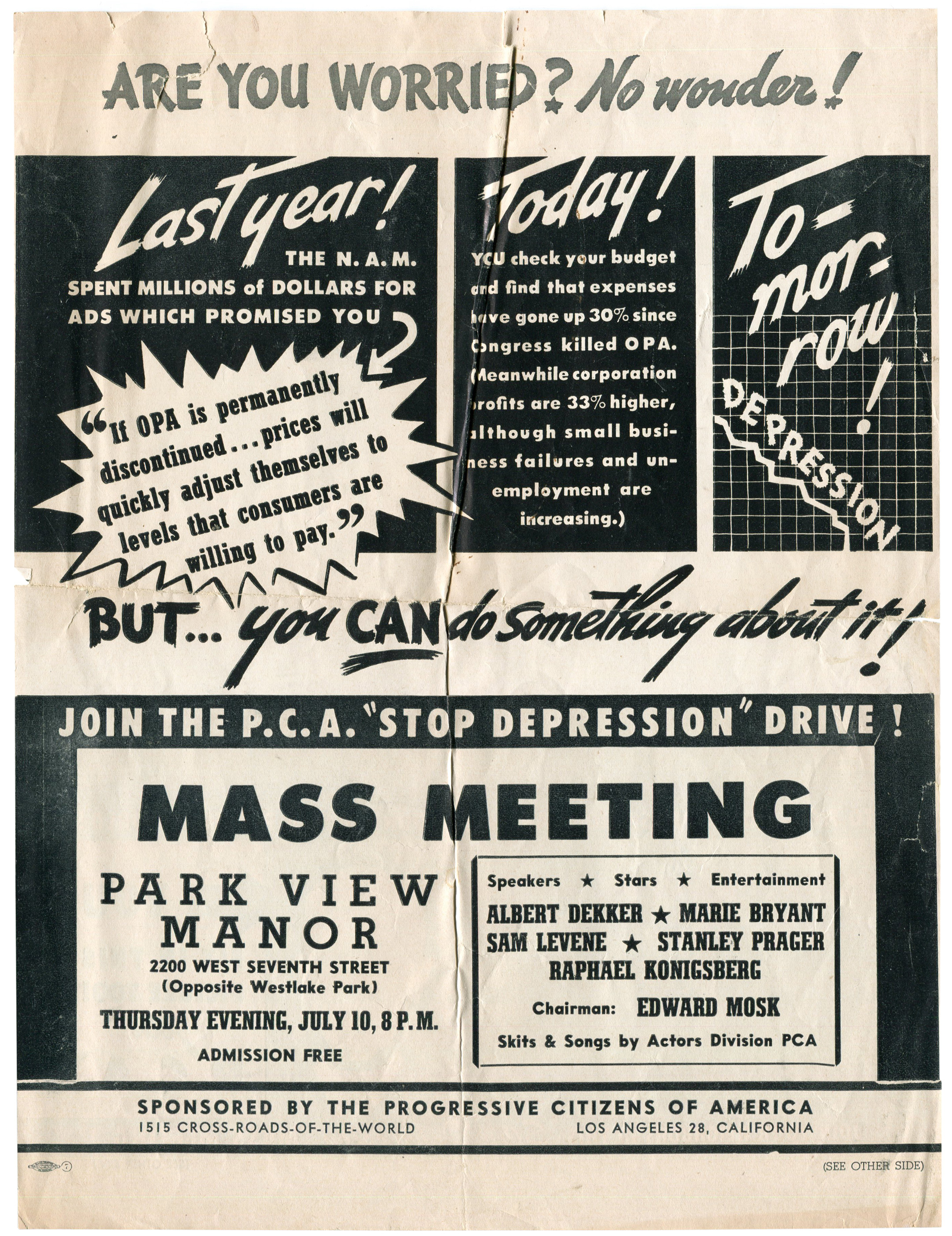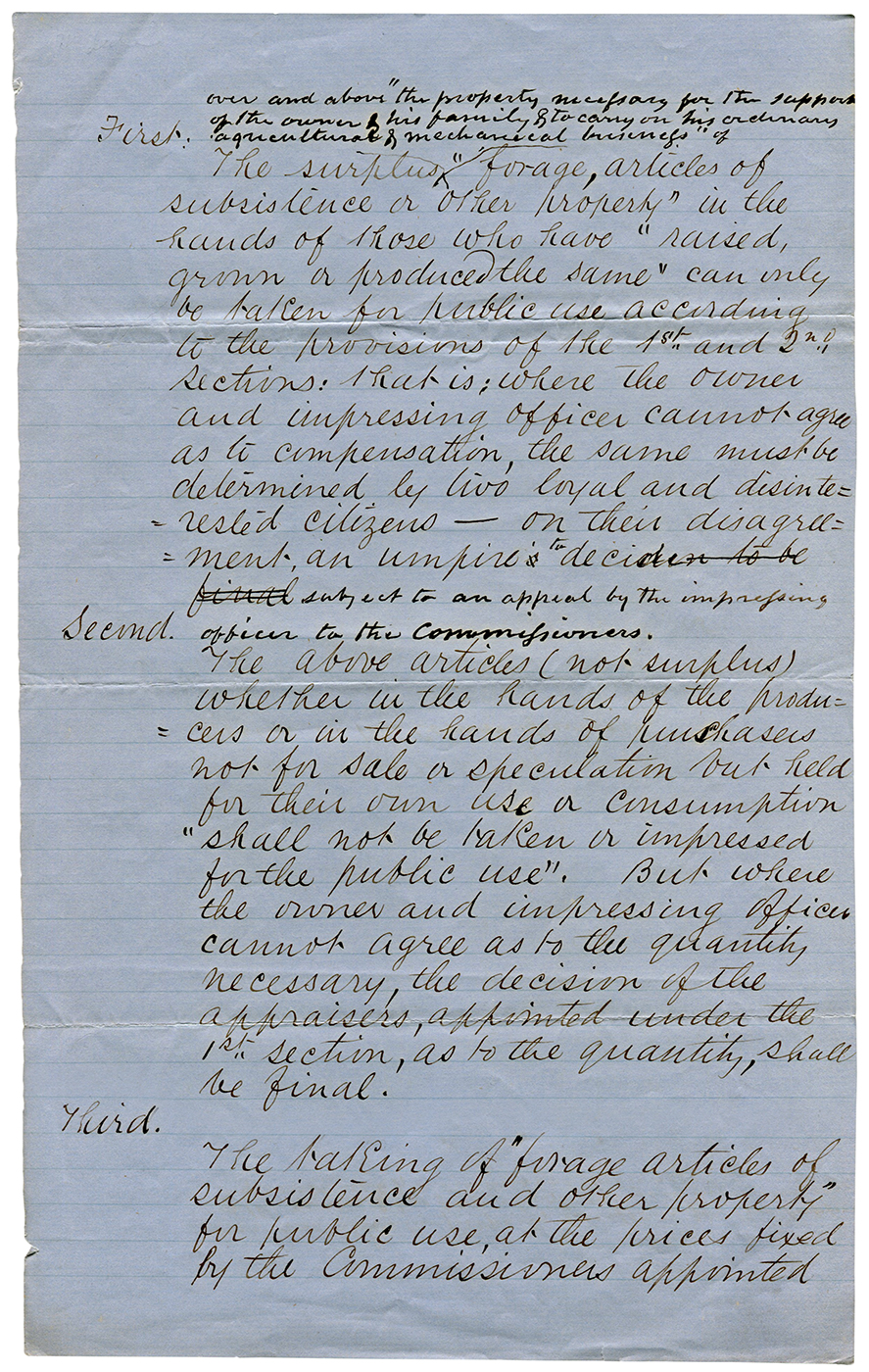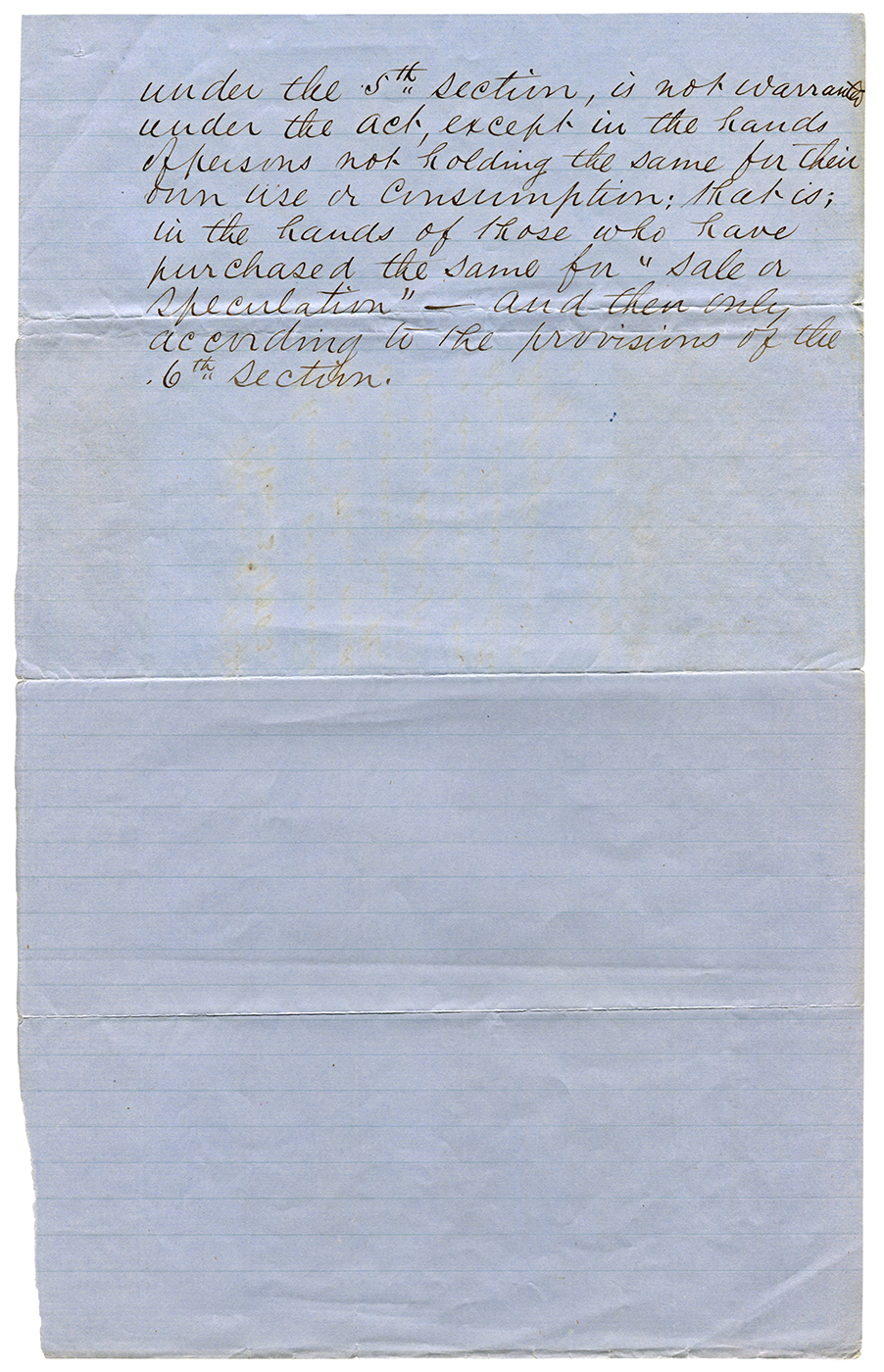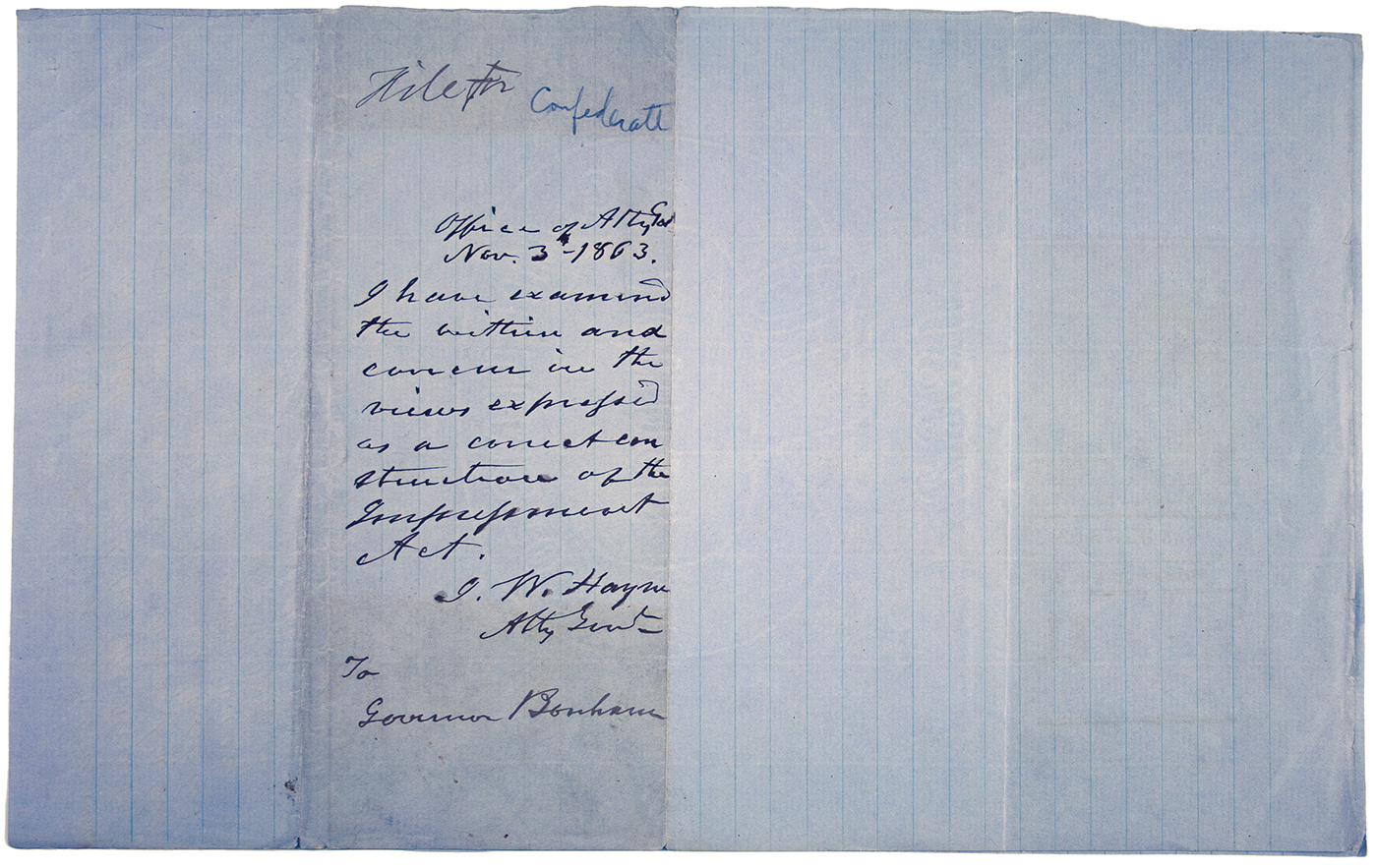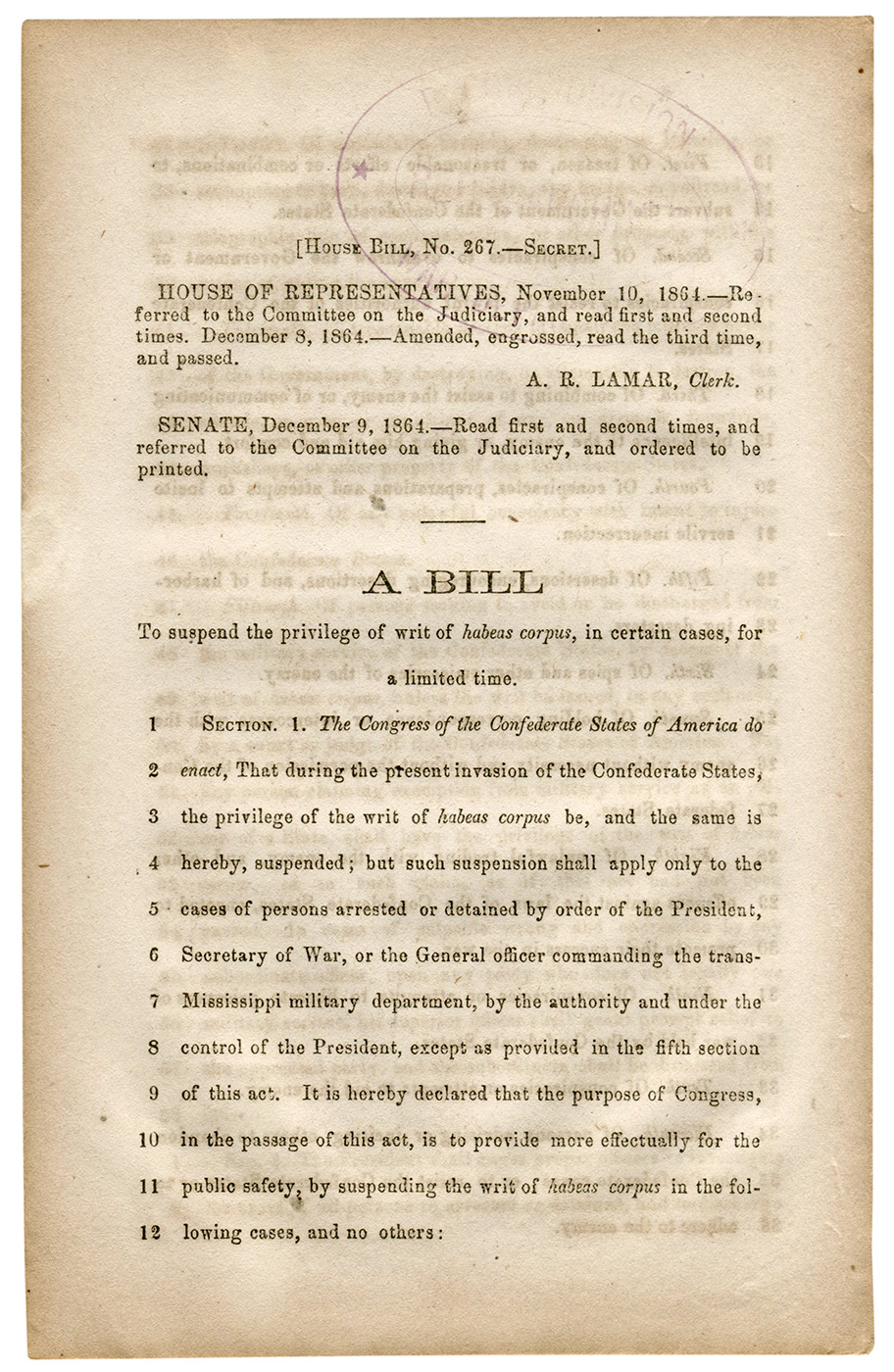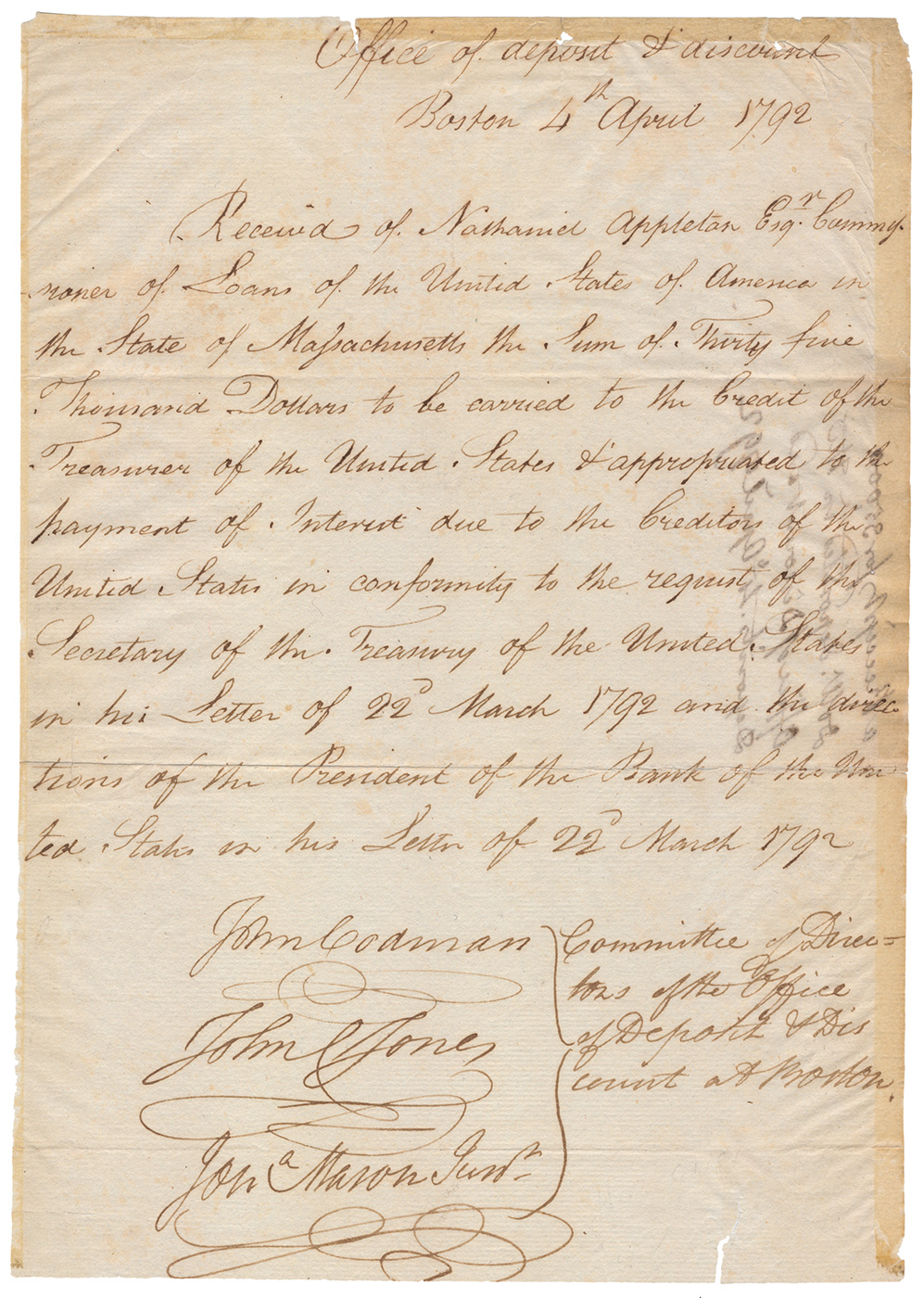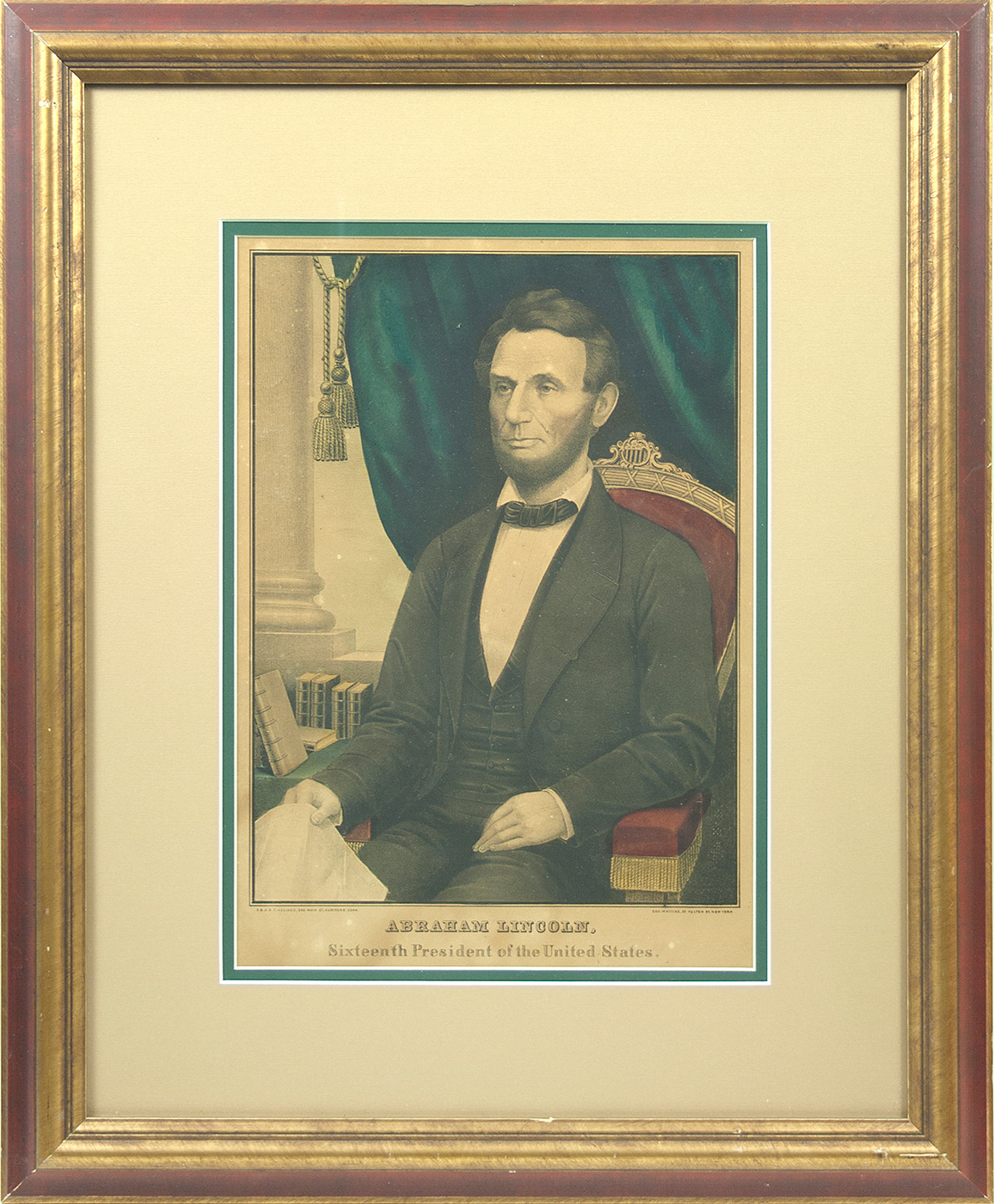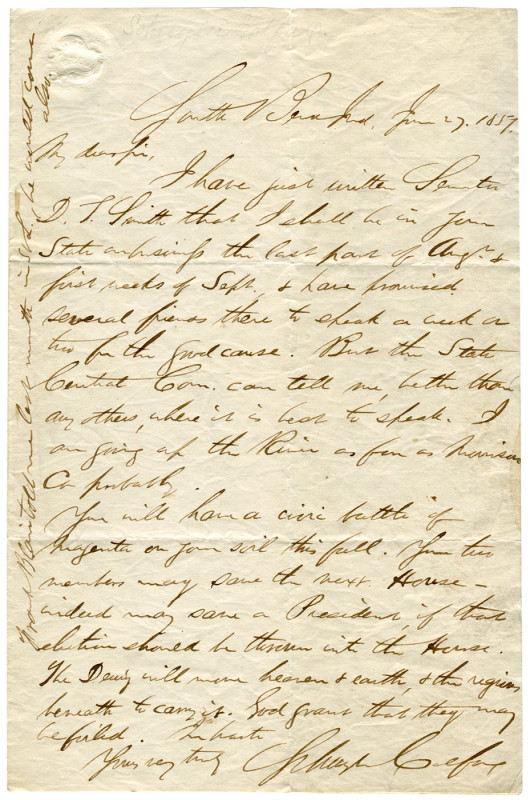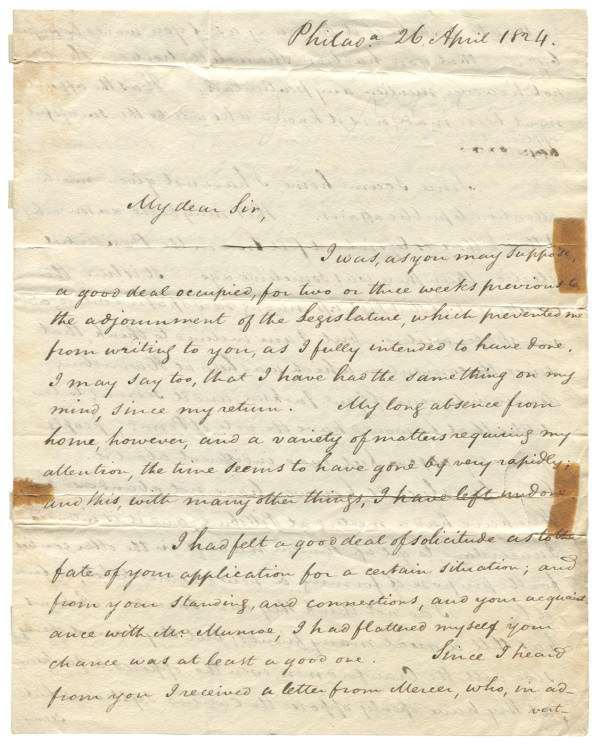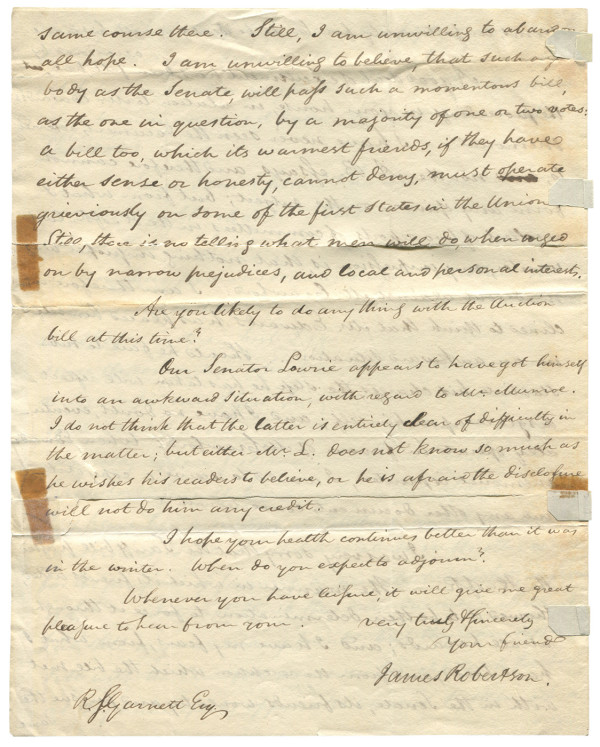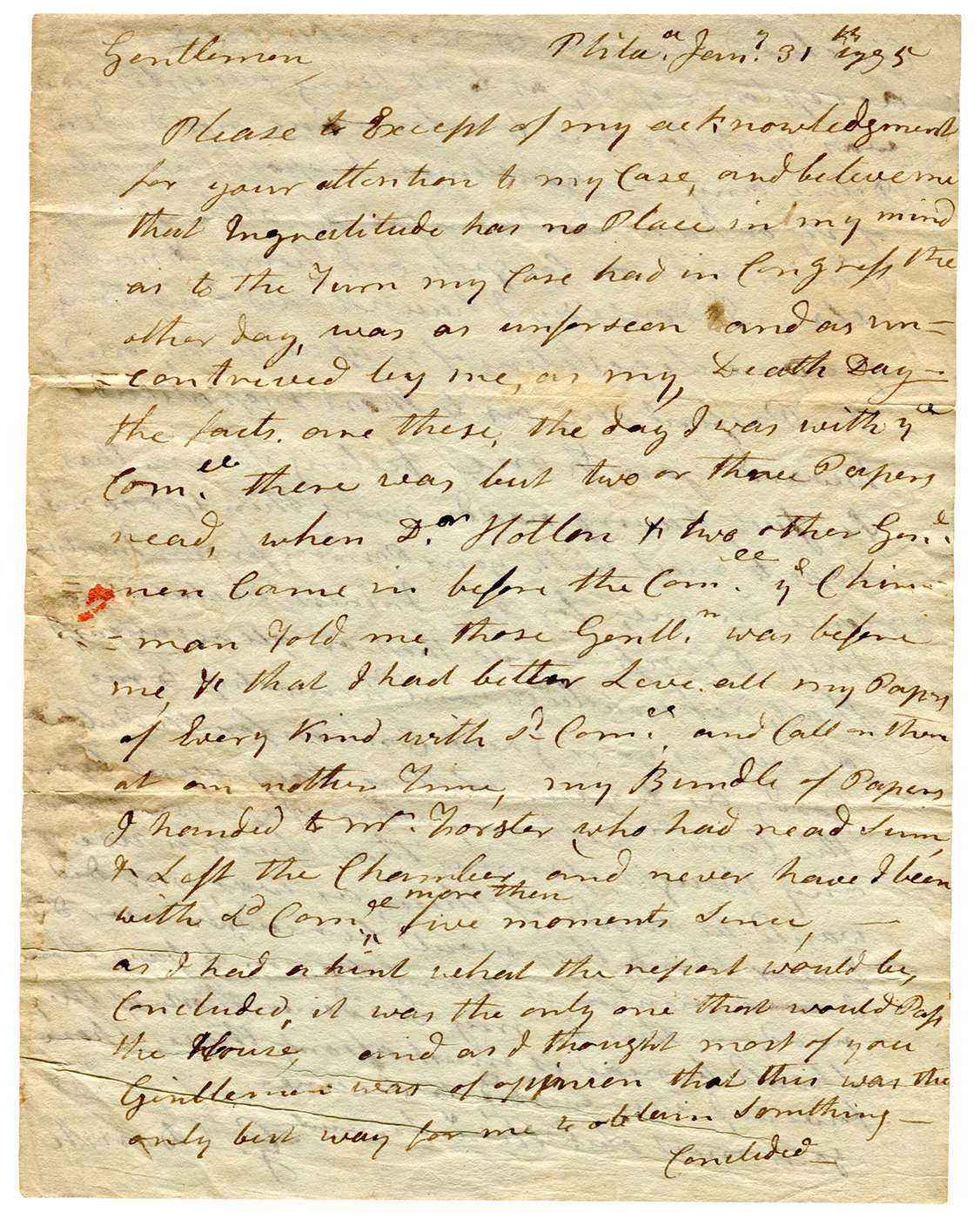
(Revolutionary War Finance) Gilbert DENCH (1742-1807) Autograph Letter Signed, “G. Dench“, 2pp., 240 x 188 mm. (9 1/2 x 7 3/8 in.), Philadelphia, 31 January 1795, likely to a member of the House of Representatives which had just denied his petition for reimbursement for an army supply contract he fulfilled in 1782 in which he was paid in depreciated paper rather than in specie as the contract specified.
Dench, whose petition had been rejected by the House of Representatives the day before, writes in full: “Please Except of my acknowledgement for your attention to my Case, and bel[i]eve me that Ingratitude has no Place in my mind as to the Term of my Case had in Congress the other day, was as unfor[e]seen and as uncontrived by me, on my, Death Day— the facts, are these, the day I was with ye Com[mitt]ee there was but two or three Papers read, when Dr. Hotlon1 [sic] to two other Gen[tl]eman told me, those Gentlem[en] was before me, & that I had better le[a]ve all my Papers I handed to Mr. Forster2 who had read Sum & left the Chamber, and never have I been with s[ai]d Com[mitt]ee more then five moments Since,— as I had a hint what the report would be, Concluded, it was the only one that would Pass the House, and as I thought most of you Gentlemen  was of opinion that this was the only best way for me to obtain Something— Concluded there would be no objection to the acceptance of it, as to it being accepted or not was not for me to Determine nor did I ever Desire any one Gentleman to op[p]ose the Acceptance of it, or have the Papers read, although my Claim was on Congress, as I thought to nowhere else. I don’t say I have not said hard things of some Legeslatins [sic] of Massachusetts, and of the Present one, as to there Ingratitude towards you & me, feeling sore in this Pursuit, having road [sic] more then 40000 miles hope to meet with your Pardon, for any Inadvertence in me, for any Int[e]rest Dictated no such Process— so that on all occasions [sic], I shall, acknowledge your Friendship to me, as well as your Great Concern for The Publick Good, as to your Letters they went before the Com[mitt]ee with my other Papers, without any thought of mine, that such a use would be made of them, as was, nor did I ever think they would be read, nor ever did I mention it to any Person to have them read,— this is my Evidence that if the Should be read it must af[f]ront, those, whose favors I ever wished to Secure.”
was of opinion that this was the only best way for me to obtain Something— Concluded there would be no objection to the acceptance of it, as to it being accepted or not was not for me to Determine nor did I ever Desire any one Gentleman to op[p]ose the Acceptance of it, or have the Papers read, although my Claim was on Congress, as I thought to nowhere else. I don’t say I have not said hard things of some Legeslatins [sic] of Massachusetts, and of the Present one, as to there Ingratitude towards you & me, feeling sore in this Pursuit, having road [sic] more then 40000 miles hope to meet with your Pardon, for any Inadvertence in me, for any Int[e]rest Dictated no such Process— so that on all occasions [sic], I shall, acknowledge your Friendship to me, as well as your Great Concern for The Publick Good, as to your Letters they went before the Com[mitt]ee with my other Papers, without any thought of mine, that such a use would be made of them, as was, nor did I ever think they would be read, nor ever did I mention it to any Person to have them read,— this is my Evidence that if the Should be read it must af[f]ront, those, whose favors I ever wished to Secure.”
In 1781 and 1782, Gilbert Dench transported clothing and other supplies for the Continental Army as a contactor. While Dench’s 1781 contract specified payment in certificates from Congress, his 1782 contract was to be paid in $20,000 of specie. However Jabez Hatch, the quartermaster responsible for paying the contract, did not have hard money available when payment came due. Instead, Hatch obtained a loan from the Commonwealth of Massachusetts and paid Dench with certificates. When Robert Morris reimbursed Massachusetts for the loan in specie, those notes rapidly depreciated in value.
Dench began petitioning Congress for redress in 1791 with the support of Elbridge Gerry.3 That petition was rejected, but Dench approached Congress again in 1795 but was again rejected. According to a separately published report issued the same year on Dench’s petition: “The Committee are of opinion, that there is no existing obligation on the United States, to make up depreciation in the present case; more especially, as the United States have paid for the services rendered by the petitioner in specie; and if there exists an obligation on any body of men, to make up to the petitioner his depreciation, it certainly must rest upon the Commonwealth of Massachusetts.”4
Undeterred, Dench petitioned the House again in 1797, which prompted a lively debate on the floor that, unlike the deliberations in 1795, were published (together with a formal report). While many of the Representatives, including Henry Dearborn, James Madison, Joseph Varnum, George Thatcher, and William Livingston sympathized with Dench’s plight, they could find no means to assist him. Jeremiah Smith of New Hampshire noted that although “Dench had been badly used… innumerable other cases were much worse. Mr. Dench suffered no more than others who took depreciated paper instead of specie. He was obliged to sell his certificates before they were due; but the citizens of Massachusetts actually paid in real specie the tax of which these certificates were partly in anticipation…the House was every day rejecting claims more equitable than this one.” Robert Williams of North Carolina feared “complying with this demand would open the door to numbers with this principle in their view.” Jonathan Dayton concurred, warning that granting Dench’s petition “would be letting in a flood of claims.”5 Still Dench persisted, petitioning Congress again in 1800 with the same response. The report issued by the House of Representatives denying Dench’s claim was worded exactly as the one they issued in 1797.6 Undaunted, Dench again approached Congress in 1800 and 1804, and was denied again.7
Dench died insolvent in 1807 and his estate was auctioned in 1811.8 Thirty years later, Dench’s heirs revived the campaign, submitting petitions to Congress in 1837, 1840, 1843, and 1846. The last time Dench’s heirs petitioned the Committee of Revolutionary Claims, it does not appear to have ever been considered as Congress’ records are silent on the matter after this point. 9 It appears that the family finally abandoned their Revolutionary ancestor’s quixotic battle for justice nearly 60 years after the first attempt.
Toning, minor creasing and edge wear, slight water damping at bottom left margin just barely affecting content, usual folds, overall very good condition.
(EXA 3506) $650
__________
1 Samuel Holten (1738-1818). Massachusetts physician and politician, member of the Third Congress, 1793-1795.
2 Dwight Foster (1757-1823) Massachusetts attorney and politician who served in Congress form 1793 to 1800, and in the Senate until 1803.
3 Maryland Journal (Baltimore), 16 Dec. 1791, 2: Elbridge Gerry presented one on Dench’s behalf, “praying compensation for damage and loss by him sustained, in contracts for transporting cloathing [sic] and military stores.”
4 Report of the Committee of Claims on the Petition of Gilbert Dench. Made the 29th of January, 1795. ([Washington: United States Congress, [1795]), 3.
5 The Debates and Proceedings of the Congress of the United States (1849), 1835-1839.
6 Report of the Committee of Claims, on the Petition of Gilbert Dench. 4th January 1797 (Evans 32995); Report of the Committee of Claims, on the Petition of Gilbert Dench. 21st March 1800 (Evans 38843).
7 United States House of Representatives, Journal, 31 March 1800; Ibid, 21 December 1804.
8 “Mansfield-Perkins Ancestry” Rootsweb. (http://wc.rootsweb.ancestry.com/cgi-bin/igm.cgi?op=GET&db=jim_stevens&id=I149): Mathew Metcalf Esqr and John Jones, yeoman, both of Hopkinton and John Fisk, gentleman of Framingham were appointed on 14 October 1807 to take inventory of Gilbert Dench’s estate. The real estate included the homestead and 70 acres in Hopkinton, an acre of land with a small house also in Hopkinton, 54 acres in Holliston, one half of 25 acres in Framingham with half of a small house & barn & half of the mills thereon, owned in common with Isaac Dench, and a pew in Hopkinton meeting house, totaling $5,630.00. With the personal estate, the estate was valued at $6,136.18. However, the debts due from the estate were also considerable, totaling $5,280.00, more than half due on mortgages, so that on 10 November 1807, John Fairbanks as executor asked that the estate be declared insolvent. Matthew Metcalf Esqr and Jeremy Stimpson, physician, both of Hopkinton, were then appointed commissioners to examine the claims. The personal estate was sold 30 November 1807, with many of the items purchased by his son Isaac Dench, his daughters’ husbands and by other relatives, including Samuel and Thomas Valentine, John Jones, Dr. Stimpson, and Peletiah Bixby. The real estate was to be auctioned Monday 1 April 1811, however, that day being very stormy, the sale was adjourned to the next Monday. The homeplace was sold to Elijah Haven, the mill to Isaac Dench, the wood lot to Dr. John O. Wilson, and the one acre in Hopkinton to Elijah Pike. The auction raised only $1579.50, so that the court ordered that the creditors be paid 22 cents for each dollar of their claim”.
9 House, Journal, 30 January 1837, 29 December 1837; 27 June 1838; 5 February 1840; 8 March 1842; 22 December 1843; Senate, Journal, 7 January 1846.
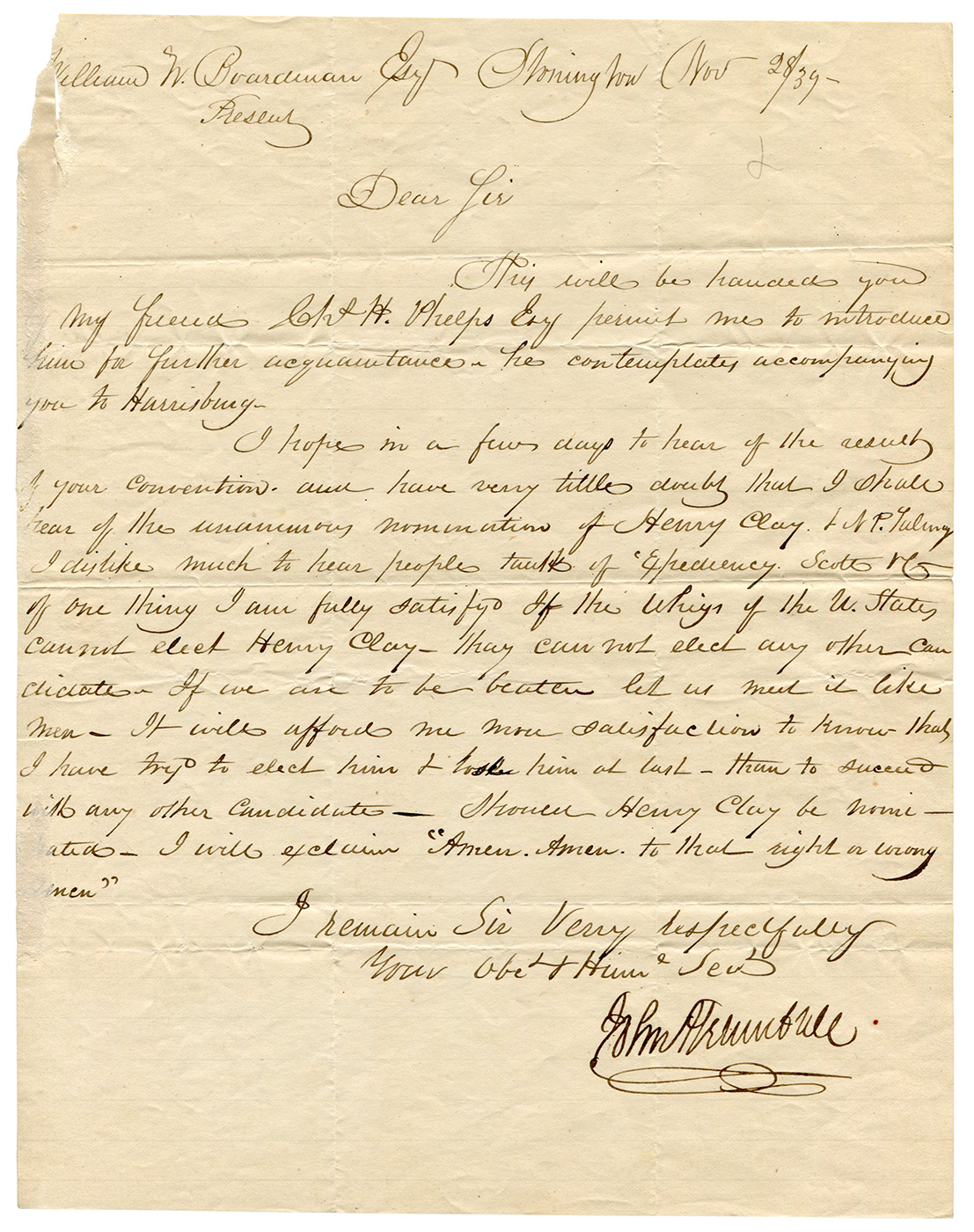 “If we are to be beaten let us meet it like men… Should Henry Clay be nominated— I will exclaim ‘Amen. Amen. to that right or wrong Amen.’“
“If we are to be beaten let us meet it like men… Should Henry Clay be nominated— I will exclaim ‘Amen. Amen. to that right or wrong Amen.’“